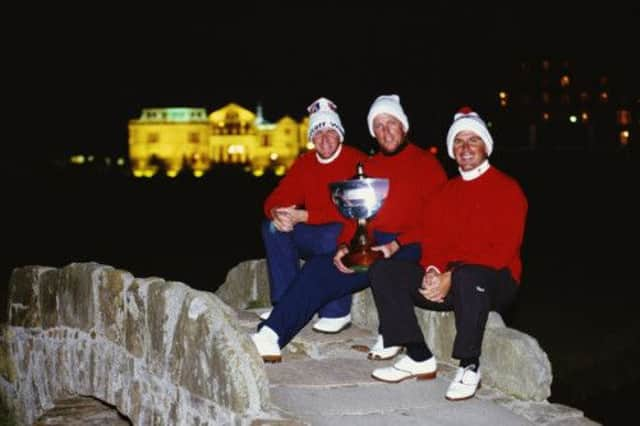Dunhill Cup: US confirm class at chilly Old Course


The Scotsman - 18 October, 1993
After defeating Sweden, the 1991 winners, in the semi-finals, the US side out-gunned the holders, England – twice winners of the trophy – in the final, the American length off the tee a crucial factor. The winners walked off with £100,000 each, while the Englishmen shared £150,000.
The losing semi-finalists took £31,666 each. The Paraguayans, who made such an impression and won many friends, earned £45,000 between them as second-place finishers in the round-robin stage, the third-placed teams – Scotland among them – won £7,500 a man, the fourth-placed, £6,500. Nick Faldo, no pigmy himself with a driver in his hands, praised the American performance and admitted he’d been consistently outdriven by around 30 yards by Couples. The laid-back Couples, whose lazy swing disguises a kick like a mule, won all five of his games.
Advertisement
Hide AdAdvertisement
Hide AdHis total was 15 under par and his highest score was his opening 71 – an astonishing record in weather which at times verged on the unplayable. Mark James, who positively blossomed in yesterday’s slightly milder weather – “I was 15 degrees warmer out there’’ – followed his morning massacre of Ronan Rafferty by making no mistakes against Stewart in the afternoon, which was just the 1991 US Open champion’s bad luck, for he’d run into an inspired Jesper Parnevik in the semi-finals, his 68 soundly trumped by the Swede’s 66 – the lowest round of the tournament. With Daly holding a two-shot lead over Peter Baker after 14 holes, much depended on how Faldo, two down at the same point, would respond to his own predicament. As it turned out, fairly typically.
A superb second was struck to 18 feet at the seventeenth, only for the putt to skirt the hole. Couples, who’d played left to set up the chip, deftly fashioned the countering 4. Even at the last, where he required an eagle 2 to square in the event of a Couples par, Faldo nearly did it, his approach pulling up inches from the cup. Couples put his second eight feet away and took the two putts he needed. Baker, who’d faltered with a 6 at the fourteenth against Daly’s 5, could make nothing of the big man thereafter, though Baker too made a supreme effort at the seventeenth, his second ending 10 feet away, but again the putter failed to respond. It was left then for Daly to bow out in style by planting his pitch to the last two feet away for a farewell birdie, which delighted his new area branch of frozen but faithful supporters.
Another bitter night left a legacy of early-morning frost and the start of play was delayed by two hours. The final began 40 minutes later than the revised time of 2pm, the Americans still gulping down hastily procured sandwiches. In the end the light held out, but just then the odds seemed against it.
The semi-finals were notable for a remarkable showing by the Americans who were a collective 13 under par in beating the Swedes, themselves ten under. Couples bogeyed the fourth on his way to a 67 and that was the only shot dropped to par by any of the US trio. The 1992 US Masters winner was rather let off the hook by Anders Forsbrand, who was one ahead of the American when he hooked his 1-iron second to the seventeenth so violently, he cleared the scoring box away to the left of the green and found the Swilcan Burn – not normally regarded as a hazard at this hole. The resultant 6 and Couples’s perfectly played 4 sent the American up the eighteenth with a shot in hand. With Forsbrand’s second some 25 feet from the hole, Couples spun a wedge to three feet above the pin and, after the Swede had putted up to make safe the par, the American holed for the birdie he didn’t really need.
That win settled the issue. The first game had gone to Sweden, Parnevik setting a 66 against Stewart’s 68. The Bell’s Scottish Open champion had also lived dangerously at the seventeenth. Two shots ahead, he pulled his second behind the scoring box, which took a bit of a peppering yesterday. After a free drop, he still had no shot on, settled for the near fringe of the green 30 feet from the pin and, with Stewart 25 feet away in two and dreaming of a two-shot swing, he holed the putt for one of the more colourful pars of the week.
Stewart could only match it and both men birdied the last. Daly, playing in the second game against Joakim Haeggman, squared the match with a 68, beautifully played at something like half-throttle, against the Ryder Cup man’s 71 and set off in search of hamburgers.
England had a relatively workmanlike win over Ireland who were best served by Rafferty, round in 70 and trounced by James, who hates the cold and suffered badly over the first three days. Yesterday, however, he gave his side a sparkling lead with a 67. Faldo was always in control against Paul McGinley and David Feherty’s last realistic chance of catching Baker vanished when a six-foot putt for a birdie refused at the sixteenth.
He clawed a shot back at the seventeenth with a superb par conjured from an awkward lie in the Road bunker after Baker had gone over the green on his way to a 5, but it was too little, too late.